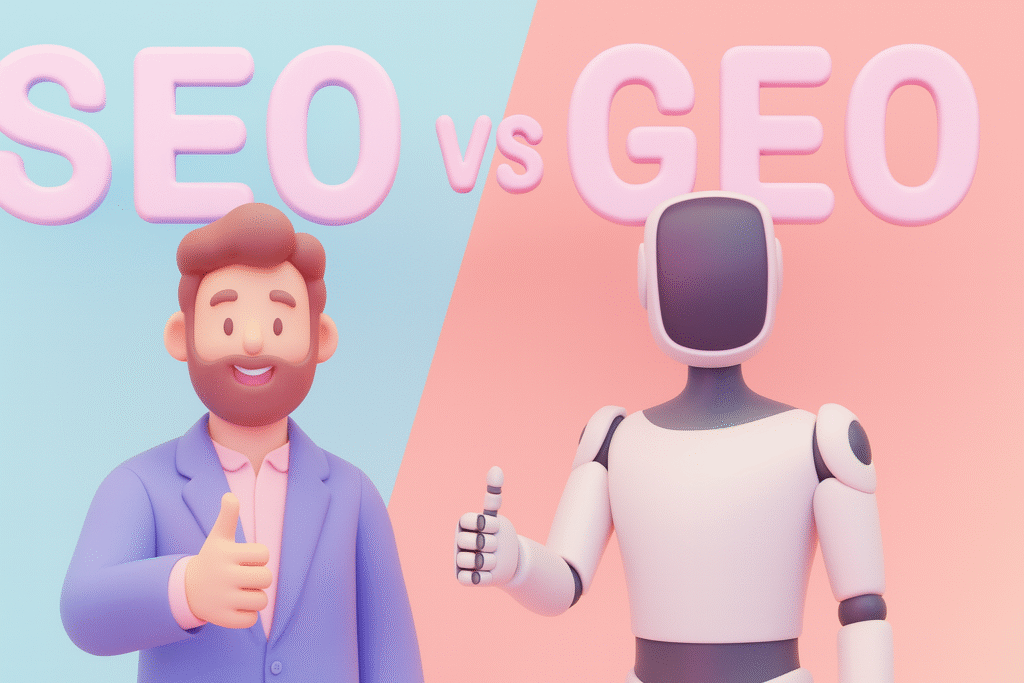“AI is changing everything“. Yes… Add one more thing to that list: the way people search.
It’s time to introduce generative engine optimization (GEO) to your search strategy.
With the rise of AI-driven engines, like Google AI, ChatGPT, or Grok, your visibility tactics must adjust.
GEO is not putting traditional search engine optimization (SEO) practices on the back burner. They are meant to work alongside one another.
In this article, we will break down GEO: what it is, how to optimize it, and how to balance it with your SEO strategy.
What is GEO?
According to Wikipedia, Generative Engine Optimization (GEO) is defined as the process of improving the visibility, relevance, and structure of content in response to queries made to generative engines, such as large language models (LLMs).
GEO switches the goal from ranking on SERPs, like traditional SEO efforts, to optimizing your content’s visibility in AI models.
The AI-powered systems are less concerned about backlinks or keywords. AI looks for relevant content that is clear, concise, and credible.
The sources that are identified as trustworthy and valuable will be what the generative engines pull from to answer the query.
Here are some examples of sources that GEO engines may pull information from:
- Trusted media sites
- NYTimes
- TechCrunch
Why: These sources work because they typically have strong domain authority, a clear structure, are fact-checked, and are often cited already in search results.
- Structured & educational sources
- Wikipedia
- Encyclopedia Britannica
✅ Why: AI often pulls information from these sites because they are concise, well-structured, and fact-checked, which aligns with AI answer formatting.
- Forums & community platforms
- Quora
✅ Why: GEO favors conversational tone and upvotes. AI often pulls from threads with high engagement and real user answers.
- Video & multimedia sources
- YouTube
- TED Talk
✅ Why: Spoken videos with high engagement, that also cover a popular topic, are easy for AI to summarize and cite to answer the search query.
- Official & institutional sites
- CDC.gov, NIH.gov
- IRS.gov, SBA.gov
✅ Why: These sites are trusted by AI and contain a consistent structure.
The new goal is not only to have your website appear at the top of the SERP, but to have your sources used and cited by AI.
To accomplish this goal, you first must be aware of how a GEO search result appears.
GEO vs. SEO on a Google Search
How can you tell if your SERPs are a practice of GEO or SEO?
Say you want to search for the “best gym membership”. You will most likely see an AI overview at the top of the search results.
Google’s AI overview is GEO in action. It uses generative AI to pull and cite information from multiple sources and arrange instant answers to search queries.
Instead of having to scroll and look through multiple articles to find your answer, Google AI prevents the need to click by providing AI-constructed summaries, facts, steps, or recommendations directly in the search result.
The generative-powered answer also provides the sources that it used to form its summary.
These websites and sources are linked directly in the query, as well as on the right-hand side of the page.
Beneath the AI-generated answer and sources, you’ll still find the traditional SEO-driven organic results: the familiar blue links shaped by keyword relevance, domain authority, and structured content.
While GEO is shifting how users discover answers, SEO remains a key part of your visibility strategy.
In fact, the two often work together: GEO may summarize insights, but it still cites and leads users to SEO-optimized content.
This brings us to a question that might have crossed your mind…
Is SEO Still Relevant?
Of course! But it’s evolving alongside GEO.
It’s true that the AI overview has negatively impacted click rates, reducing them by nearly 35%.
Organic results are becoming less visible – half the battle is getting the user’s eyes on them to begin with.
Not only are your SEO efforts fighting to be seen beneath the paid ads, but now AI overview takes up almost half of a user’s screen – 42% of the screen on desktop, 48% on mobile.
And if the user hits “show more,” they may have to scroll a few times to finally see the organic results.
The impact that GEO has on SEO may discourage you from maintaining strong SEO efforts, but remember that GEO does not work without great SEO first.
Think of SEO as the foundation that allows your content to be visible – and GEO as the next layer, using similar principles to appear in AI search queries.
They aren’t opposites; they’re evolving together – both relying on relevance, authority, and content structure to surface quality information.
Let’s take a look at how GEO and SEO work together.
GEO vs. SEO – Key Battle in 2025
1. GEO Still Relies on SEO-Optimized Content
AI-driven engines seek content that is well-structured, clear, and easy to read (qualities that are rooted in SEO best practices).
To generate helpful answers, Google needs to crawl, understand, and trust your content.
This means clean HTML, proper use of keywords, header tags (H1–H3), internal linking, and schema markup all still matter.
Without these SEO fundamentals, GEO likely won’t find or cite it.
These technical SEO elements help AI systems analyze your page and determine whether it’s credible enough to cite.
You’re no longer optimizing just to rank first, but to be referenced by AI-generated answers, sometimes even when your site isn’t in the top few organic results.
Clear SEO Structure Improves GEO Summarization
The goal of GEO is to analyze credible sources and provide an answer to the search through brief summaries, quick recommendations, or by providing a step-by-step guide, etc.
To generate an accurate answer, the AI machines break down content and summarize it to provide an answer directly.
SEO-friendly formatting makes it easier for AI to do this.
For example, content that features:
- FAQ sections and concise bullet points
- Author bios that establish expertise (E-E-A-T)
- Structured data like HowTo, FAQPage, or Article schema
…is far more likely to appear in GEO citations or be summarized in the AI Overview.
Strong SEO Boosts GEO Visibility
Strong SEO-formatted content not only gets you clicks – now it raises your chances of being cited by AI.
Recent data shows a clear trend: content that ranks well in the top 10 organic results is far more likely to be cited in AI Overviews.
A Surfer SEO study shows that 52% of sources mentioned by Google AI overviews rank in the top 10 results.
Let’s take this search, for example:
The AI overview cites multiple sources. Let’s see if they appear in the organic search.
Just in the top 5 organic searches, we see 2 of them have been cited by Google AI:
- Travel US News
- Go Ask A Local
In short: If your SEO is strong, your chances of being picked up by GEO go way up. You’re not just writing content for human users anymore. You’re structuring content for AI machines to trust, analyze, and summarize.
Shared Goal: Answer the User’s Query
At the end of the day, GEO and SEO are working to achieve the same goal – to provide the best answer to the user’s search quickly.
Both efforts prioritize content that answers questions clearly, quickly, and accurately.
But they do operate differently.
Let’s break down the key differences between GEO and SEO so you can better understand how to optimize for both.
5 Key Differences of GEO and SEO
1. How Results Are Displayed
When doing a Google search, SEO shows ranked blue links in a traditional list based on keywords, backlinks, and authority.
Where GEO delivers direct, summarized answers, typically above organic results, pulling from multiple sources in a single response.
2. User Experience & Interaction
SEO encourages clicks.
Traditional SEO is organized for users to click through the results to find the answer they’re looking for.
GEO reduces clicks.
Where GEO delivers the answers directly on the page in the AI-generated summary.
AI provides the sources it used to provide an answer, giving the user the option to click those sites.
But clicking through multiple websites is not necessary for the user to find their answer.
3. Optimization Approach
Traditional SEO focuses on keywords, backlinks, and technical performance to be recognized as authoritative by the search engine.
Optimizing basic SEO elements to rank high in organic search was the main priority.
With GEO, the priority has shifted.
Creating content that is easy to interpret – focusing on structure and readability – is how to optimize for AI-powered engines.
4. Source Attribution
SEO ranks an entire web page based on factors like relevance, keywords, backlinks, and overall content quality.
In contrast, GEO uses and cites specific parts of a website to generate a response to a search query.
Their answers are often made up of a combination of various sources – pulling only certain parts of a website that is relevant to the query – to put together a single answer.
While SEO focuses on full-page optimization for visibility, GEO prioritizes only the most relevant pieces of information.
5. Traffic Intent and Outcomes
Traditional SEO efforts aim for a high click rate and to drive traffic to your website.
The goal is to rank high on the search engine, increase visibility, and turn those clicks into conversions.
GEO does not prioritize clicks or conversions.
Rather than driving traffic to a site, GEO aims to deliver an answer within the search engine so the user gets their answer quickly, reducing the need to click through.
With SEO, success means appearing in the top organic results.
With GEO, success means having your content cited or surfaced by AI, boosting your brand’s authority and visibility, even if users don’t land on your page.
Forum Favored Content
Both SEO and GEO favor community platforms, like Reddit.
But, of course, these forums benefit both differently.
- GEO
Reddit appeals to AI-driven engines, like Google AI, because the threads are full of real-user answers and conversations from a diverse group of people.
They contain authentic perspectives and advice from real people – making it easy for AI to trust and summarize.
Having your brand mentioned in a Reddit discussion can significantly boost your chances of being cited in an AI-generated answer.
- SEO
Community forums like Reddit also benefit your SEO ranking.
Often, these threads and discussions answer questions in a natural, long-tail keyword style.
By engaging in relevant threads, it can drive referral traffic to your website, build backlinks, and increase brand awareness – all benefiting your organic search.
For example, this search regarding the best social media marketing company shows community platforms, both Quora and Reddit, appearing in both the organic search results and the AI-generated answer.
While they display differently, high-engagement forums that obtain real-user conversations are beneficial to both your SEO and GEO efforts.
How to Balance Generative AI and Organic Search
1. Write Content for Both Humans and AI
Your content should be easy for people to read and easy for search engines or AI to interpret.
A traditional SEO structure includes elements like:
- Clear headlines
- Bullet points
- Listicles
- How-to-Guides
- FAQs
…have a better readability – allowing SEO and GEO to favor and pull your information accurately.
It’s about writing for two audiences at once – for the search engine to rank your website in the top 10, and for AI to cite your content.
2. Prioritize Credibility, Not Just Keywords
Good SEO depends heavily on keywords and backlinks, but GEO cares more about content that is clear, authoritative, and accurate.
This doesn’t mean stop targeting keywords in your content.
But don’t stop there.
Show your expertise through author bios, reliable and authoritative sources, and current facts so both Google and AI tools know they can trust you.
The more credible you appear, the more likely your content will be used.
3. Focus on Topical Authority, Not Just Page Rankings
While traditional SEO rankings are based on the relevance of your whole website, GEO pulls information from various platforms (blogs, forums, official sites) regardless of how the site ranks.
Write content that answers common questions thoroughly and clearly, so it can be cited or summarized.
Create content about the same topic in depth so AI engines discover that you are an expert on the idea.
Appearing on the first page of Google remains a priority – but with the evolving world of search, your website appearing as a citation in an AI answer is an additional priority.
4. Leverage High-Engagement Forums and Platforms
Your target audience isn’t just looking for answers on your website: they are on community forums (like Reddit), YouTube, and other high-engagement spaces.
GEO often uses these platforms in their summaries because they have high engagement and real-user answers or opinions.
Creating or sharing content across these platforms will expand your digital presence and make you more accessible for AI to feature you in their responses.
Think beyond your website. Your presence on other platforms also feeds into GEO.
5. Think Brand Visibility, Not Just Website Traffic
SEO success is about click-throughs and traffic. GEO success is about being cited or featured in AI answers, even without the user visiting your site.
Track mentions, citations, and branded queries as part of your success metrics, not just organic clicks.
Adapt your strategy for both visibility and credibility. When AI finds your content to be trustworthy and credible enough to use it in answers, that trust reflects on your brand.
The Future of GEO and SEO: Looking Ahead
Generative AI search isn’t replacing SEO. It’s transforming how we optimize and approach it.
The goal is not only about showing up high in search results anymore, but also about creating the kind of content that AI wants to use and cite when generating an answer.
That means creating content that’s easy to find, easy to understand, and backed by real expertise – for humans and AI engines.
Businesses that balance both approaches will have the best shot at staying visible, whether users click through to their site or find their answer directly in the search results.
Ultimately, being cited by AI is becoming the new #1 organic search. Learn how to write content for people and AI – and you will be rewarded.









